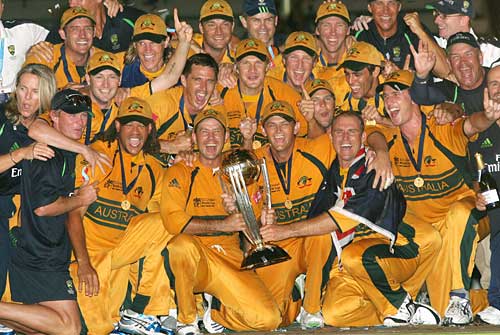 |
| Australian Cricket Team in England 1882 (Source: Wikipedia) |
Australian Cricket Team has been dominating the sport since it's inception. They won the first-ever test match back in 1877 by defeating the English team by 45 runs at the MCG. The first centurion of the sport was Charles Bannerman who achieved the feat in that very game with a score of 165. Then came several early legends of the game followed by "THE DON". Don Bradman's arrival was the icing on the cake on the Australians' dominance and they were very successful in the 20th century. Most of the players playing in those teams are still remembered by many but the one team who is remembered by every cricket fan is the Australian team in the 2000s. The team was first captained by Steve Waugh and then perhaps the greatest captain of the modern game Ricky Ponting.
My cricketing knowledge is limited to events mostly happening after the 2003 world cup and that is the time Ricky Ponting's side was wreaking havoc. As the experts say the team's bench was so strong that an eleven could be formed from them and they could beat the main eleven. It's true the players from that team never held an individual record to their name, but as a team, they were undoubtedly the best. They won both the world cups of the decade. They even won two consecutive Champions Trophy in that period. The squads were equally dominant in Tests and ODIs and later T20s too. Discussing players is my favorite thing and I'll do it once again.
The test openers in Justin Langer and Matthew Hayden were the best a team could think of. In ODIs, it was Adam Gilchrist who partnered Hayden in creating a nightmare for bowlers. When we think about their backups, there were Simon Katich and Phil Jaques earlier and later David Warner, Shane Watson and Chris Rogers joined the group. The middle-order was even better. The mainstay Ricky Ponting is one of the best Number 3 to have ever played the game. He was joined by Damien Martyn, Darren Lehmann, Michael Clarke, Michael Bevan, Brad Hodge, James Hopes, and the superman Andrew Symonds. There were a lot of players like Stuart Law and Marcus North who were amassing tons of runs in the domestic circuit but couldn't start consistently for the national team and thus fell out of favor soon. The team didn't have a recognized all-rounder for most of the period apart from Shane Watson but the likes of Ian Harvey, Brad Hogg, and Symonds always came-in handy. Brad Haddin was the perfect backup to Gilchrist who later in his career proved his worth very well.
 |
| Australian Team in 2007 |
The main attraction of this generation of cricketers was the fast bowlers who consistently dominated the batsmen for years. The trio of Glenn McGrath, Jason Gillespie, and Brett Lee was exceptional because each of them had unique skills in them. The best thing was that Brett Lee was a decent batsman and at times even compensated for bowling all-rounder. Mitchell Johnson later joined the team and along with Ryan Harris filled the void left by McGrath and Gillespie. The early backups Andy Bichel (has the 2nd best bowling figures for an Australian in ODIs) and Michael Kasprowicz were quite decent and Nathan Bracken was unfortunate not to stay consistently in the eleven. Bracken even ranked number one ranked ODI bowler for a duration but injuries shortened his career. The more recent backup bowlers were Shaun Tait who was really fast and is today a proven veteran in the domestic circuit. Peter Siddle also started featuring for the Aussies and later led the attack for some years. Australia is not known for producing great spinners but the greatest leg spinner to have graced the game is interestingly an Australian, Shane Warne, he was a magician and his dismissal of Andrew Strauss was one of those examples, and another interesting thing is that the greatest backup spinner of the game was also an Australian in Stuart MacGill. If he didn't play for Australia or played in some other generation he'd probably have a chapter in the history books of cricket. There were more pace bowlers in Bollinger, Hilfenhaus, Stuart Clark and more who performed decently whenever they played.
The main reason for this dominance was the well managed domestic circuit of Australian cricket. The players take the domestic fixtures very seriously unlike most of the countries today. A lot of players have more than 20000 runs and 500 wickets to their name but the massive competition meant that they could never break into the main team. Still, they were equally dedicated to their state sides. The Australian team's dominance in recent years has indeed fallen down but even today their unlimited overs domestic fixtures are a treat to watch. Australian cricket is very fortunate to have this problem of plenty which should carry on for years.


Comments
Post a Comment